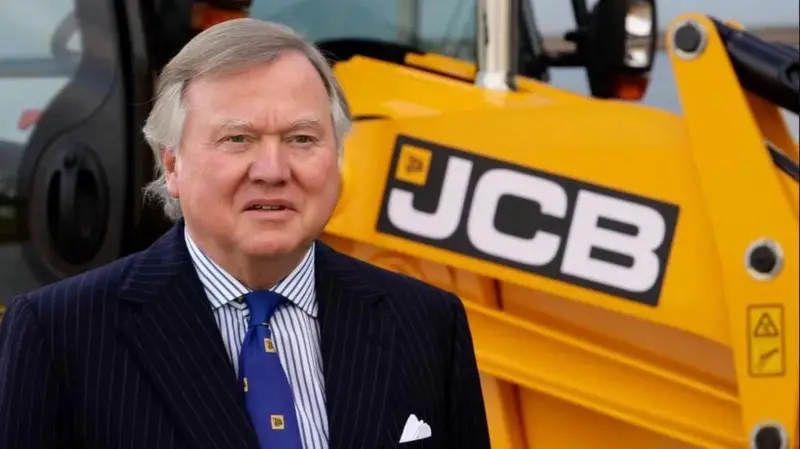Lord Bamford and the £300 Million Windfall: A Look into JCB’s Success and the Implications Ahead
Lord Bamford and his family have recently celebrated a staggering £300 million windfall from their JCB business empire, following a remarkable year for the construction equipment manufacturer. According to the latest accounts, JCB’s profits surged by 44% to £805 million in 2023, marking a significant achievement for the company and its stakeholders.
This substantial dividend payment was approved by Lord Bamford in late May, coinciding with the aftermath of the recent general election that saw the Labour Party take the reins of government. As the new administration prepares to unveil its Budget next week, speculation is rife regarding potential tax reforms aimed at the UK’s wealthiest citizens. Labour leader Sir Keir Starmer has made it clear that his party intends to ensure “those with the broadest shoulders bear the heavier burden,” hinting at possible changes to capital gains and property taxes.
Labour’s Tax Plans and Their Impact
Labour’s proposed tax reforms include a commitment to freeze taxes for “working people,” specifically excluding those who hold significant investments, such as shares or second homes. This policy direction has raised alarms among affluent families and business owners, who are concerned about the potential introduction of a wealth tax. The prospect of a 2% levy on individuals with assets exceeding £10 million has been floated by some Labour MPs, igniting a debate about the implications for investment and economic growth in the UK.
Critics of such a wealth tax argue that it could deter investment and stifle entrepreneurial growth, potentially pushing high-value businesses and individuals to relocate outside the UK. As the Bamford family enjoys their financial success, they are not immune to the shifting political landscape and the potential repercussions of these proposed tax reforms.
The Bamford Family Legacy
Lord Bamford, a prominent industrialist and staunch supporter of Brexit, has a long history of political engagement, having been a significant donor to the Conservative Party. His contributions have supported various leaders, including former Prime Ministers David Cameron, Boris Johnson, and Liz Truss. JCB, the Staffordshire-based manufacturing giant, remains wholly owned by the Bamford family, who now boast an estimated fortune of £5.9 billion.
The Bamford family has a rich entrepreneurial tradition. Lady Bamford founded the Daylesford Organic farm shop chain, while their son, Jo Bamford, owns the bus company Wrightbus. Since inheriting JCB from his father, Joseph Cyril Bamford, Lord Bamford has transformed the company into a global powerhouse, competing with American giants like Caterpillar and John Deere. The iconic 3CX Sitemaster backhoe loader is just one example of JCB’s popular product lineup.
JCB’s Current Performance and Future Outlook
Despite the impressive financial performance in 2023, JCB is bracing for challenges in the upcoming year. Recent reports indicate that the company has already made cuts of over 230 UK-based agency jobs due to lower-than-expected global demand for manufacturing. JCB’s chief executive, Graeme Macdonald, has adopted a cautious outlook for 2024, citing difficulties in the UK and European markets, particularly concerning a contraction in housebuilding and a decline in Germany’s economic activity.
As the manufacturing sector faces mounting pressures, JCB and similar companies may encounter significant hurdles in the months to come. The combination of a robust dividend payout and the looming threat of tax reforms creates a complex landscape for the Bamford family and their business interests.
The Broader Economic Context
The recent financial success of JCB and the Bamford family’s windfall come at a time when the UK economy is navigating a challenging landscape. With Labour’s new government signaling a shift in tax policy, the implications for wealth distribution and investment strategies are becoming increasingly relevant. As the Budget approaches, stakeholders across various sectors are keenly observing how these changes might affect their financial futures.
In summary, the Bamford family’s substantial dividend from JCB highlights both the successes of the construction equipment manufacturer and the potential challenges posed by the evolving political and economic environment in the UK. As the country grapples with the implications of new tax policies, the future of wealth and investment in Britain remains uncertain, particularly for those at the top of the economic ladder.
